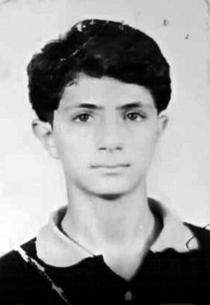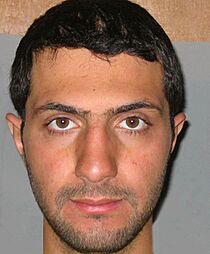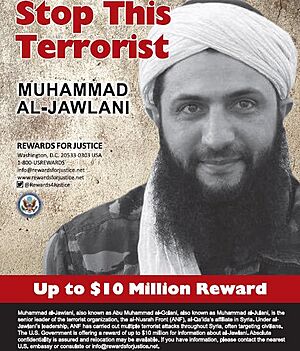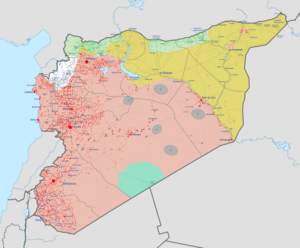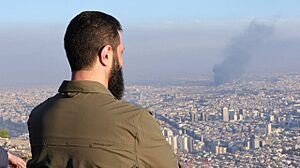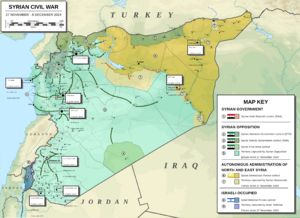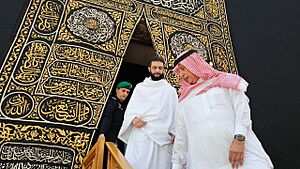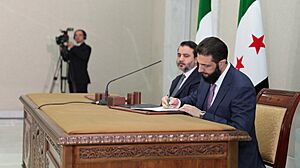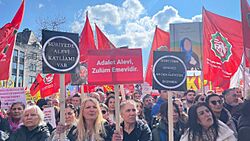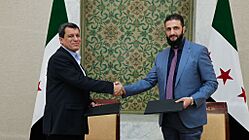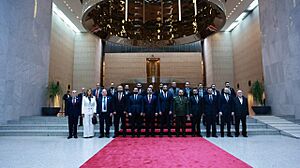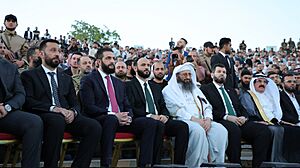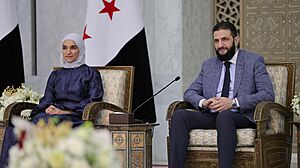Ahmed al-Sharaa facts for kids
Quick facts for kids
Ahmed al-Sharaa
|
|
|---|---|
|
أحمد الشرع
|
|
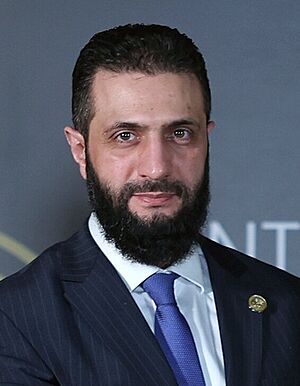
Al-Sharaa in 2025
|
|
| President of Syria | |
| Assumed office 29 January 2025 |
|
| Prime Minister | Mohammed al-Bashir (2024–2025) |
| Preceded by |
|
| Leader of Syria | |
| De facto 8 December 2024 – 29 January 2025 |
|
| Prime Minister |
|
| Preceded by | Bashar al-Assad (as President) |
| Succeeded by | Himself (as President) |
| Emir of Hay'at Tahrir al-Sham | |
| In office 1 October 2017 – 29 January 2025 |
|
| Preceded by | Abu Jaber Sheikh |
| Succeeded by | Position abolished |
| Emir of the al-Nusra Front | |
| In office 23 January 2012 – 28 January 2017 |
|
| Preceded by | Position established |
| Succeeded by | Position abolished |
| Personal details | |
| Born |
Ahmed Hussein al-Sharaa
29 October 1982 Riyadh, Saudi Arabia |
| Political party | Independent (since 2025) |
| Other political affiliations |
Hay'at Tahrir al-Sham (2017–2025) |
| Spouse |
Latifa al-Droubi
(m. 2012) |
| Children | 3 |
| Parent | Hussein al-Sharaa (father) |
| Relatives | Maher, Hazem, and Jamal al-Sharaa (brothers) Farouk al-Sharaa (first cousin, once removed) |
| Residence |
|
| Signature |  |
| Nickname | Abu Mohammad al-Julani |
| Military service | |
| Allegiance |
Formerly
|
| Years of service | 2003–present |
| Rank | Commander-in-chief (HTS) |
| Battles/wars |
See list
|
Ahmed Hussein al-Sharaa, born on October 29, 1982, is a Syrian politician. He is also known by his nickname, Abu Mohammad al-Julani. Since January 2025, he has been the President of Syria. Before that, he was the country's de facto (unofficial) leader from December 2024.
Al-Sharaa was born in Riyadh, Saudi Arabia. His family was Syrian and came from the Golan Heights. He grew up in Damascus, the capital of Syria. He joined a group called al-Qaeda in Iraq before the 2003 invasion of Iraq. He fought in the Iraqi conflict for three years. American forces captured and held him from 2006 to 2011. He was released around the time the Syrian Revolution began against the government of Bashar al-Assad.
In 2012, al-Sharaa started the al-Nusra Front with support from al-Qaeda. This group fought against the Assad government in the Syrian civil war. As the leader of al-Nusra, al-Sharaa built a strong base in the northwestern Idlib Governorate. He refused to join another group called the Islamic State, which led to fighting between them. In 2016, al-Sharaa cut ties with al-Qaeda. Since then, he has tried to show a more moderate side. He has said he is against global extremist actions and wants to focus on governing Syria. He also promised to protect Syria's minority groups.
Al-Sharaa combined al-Nusra with other groups to form Hay'at Tahrir al-Sham (HTS) in 2017. He was its leader until January 2025. HTS set up a government called the Syrian Salvation Government (SSG) in the areas it controlled in Idlib. This government collected taxes and provided public services. However, it also faced protests and criticism for being too strict. In November 2024, al-Sharaa led an 11-day attack against the Assad government. His forces quickly won battles in Aleppo, Hama, Homs, and Damascus. Israel also entered southwestern Syria in December 2024 as Bashar al-Assad left for Russia.
Al-Sharaa was the unofficial leader of Syria's temporary government from December 8, 2024, until January 29, 2025. On that date, he was named president of Syria at a special meeting in the presidential palace. As president, al-Sharaa has visited other countries. He also signed an agreement with the Syrian Democratic Forces to bring their military and civil groups into the Syrian government. He signed a temporary constitution that set up a five-year period for changes. He also announced a new transitional government. In 2025, Time magazine named him one of the world's 100 most influential people.
Contents
Early Life and Beginnings
Growing Up in Syria
Ahmed Hussein al-Sharaa was born on October 29, 1982, in Riyadh, Saudi Arabia. He came from a middle-class family with four brothers and two sisters. His father worked as an oil engineer, and his mother was a geography teacher. The family moved back to Syria in 1989 and lived in the Mezzeh area of Damascus.
As a child, al-Sharaa worked part-time in a grocery store his father owned. He often went to the Shafi'i mosque in his neighborhood. When he was seventeen, he became more religious. People who knew him described him as a quiet and shy boy who wore thick glasses. He was smart but preferred to avoid attention.
Al-Sharaa said that he and his father both cared deeply about defending the Palestinians. He also mentioned that the Second Intifada in 2000 greatly influenced his life choices. He started thinking about how he could help people who were being treated unfairly. He studied media and medicine at Damascus University for two years. In 2003, he moved to Iraq.
Joining the Conflict in Iraq
Al-Sharaa traveled to Baghdad, Iraq, just weeks before the 2003 U.S. invasion of Iraq. He quickly moved up in the ranks of al-Qaeda in Iraq (AQI). Some reports suggest he was a close helper to the AQI leader, Abu Musab al-Zarqawi. However, al-Sharaa has said he never met al-Zarqawi and only served as a regular soldier against the American presence.
After al-Zarqawi was killed in 2006, al-Sharaa left Iraq briefly. He then returned to continue fighting but was arrested by American forces. He was held for over five years in different prisons. During this time, he reportedly taught classical Arabic to other prisoners, which made him popular.
Syrian Civil War Leadership
Starting al-Nusra
After being released from prison, al-Sharaa was asked to start al-Qaeda's operations in Syria in August 2011. He entered Syria with money and a plan to set up al-Qaeda there. He formed a group called Jabhat al-Nusra, also known as the Al-Nusra Front. This group was meant to be a large alliance of groups fighting in Syria, loyal to al-Qaeda. During this time, al-Sharaa used the name Abu Mohammad al-Julani.
Al-Nusra became one of the strongest groups in Syria under al-Sharaa's leadership. Its main base was in the Idlib Governorate in northwestern Syria. In December 2012, the U.S. government officially called Jabhat al-Nusra a terrorist organization. In May 2013, al-Sharaa was also listed as a "Specially Designated Global Terrorist."
Disagreements with ISIS
As al-Sharaa gained power in Syria, leaders of the Islamic State of Iraq (ISI) became suspicious of him. Al-Nusra was becoming popular for helping people and working with other Syrian groups against the Assad government. Al-Sharaa did not follow orders from ISI to fight these other groups.
In April 2013, ISI's leader, Abu Bakr al-Baghdadi, announced that al-Nusra would merge with ISI to form the Islamic State of Iraq and Syria (ISIS). This merger would have made al-Nusra lose its independence. To keep al-Nusra separate, al-Sharaa publicly promised loyalty directly to al-Qaeda's main leader, Ayman al-Zawahiri. Al-Zawahiri confirmed that al-Nusra was independent from ISI.
By February 2014, al-Qaeda officially cut ties with ISIS, leaving al-Nusra as its only group in Syria. Open fighting then began between ISIS and al-Nusra. Al-Sharaa warned that this fighting would help the Assad government. Over the next months, ISIS took control of much of the land held by al-Nusra and other Syrian groups.
Threats to the United States
After the U.S.-led airstrikes against ISIS began in Syria, al-Sharaa spoke publicly. He said the airstrikes were an attack on Islam. He warned that this would bring the conflict to Western countries. He urged his fighters not to accept help from Western nations in their fight against ISIS. He also said al-Nusra would fight any group that took money or weapons from America.
Al-Nusra's New Direction
In May 2015, al-Sharaa gave an interview where he hid his face. He said that al-Nusra had no plans to attack Western targets. He stated their main goal was to fight the Syrian government, Hezbollah, and ISIS. He mentioned that al-Qaeda's leader had given clear orders not to use Syria to attack the U.S. or Europe.
He also said that after the war, all groups in Syria would discuss how to form a new government. He added that al-Nusra would not target Syria's Alawite minority, even though they supported the Assad government.
Breaking Ties with al-Qaeda
After Russia joined the war, the Syrian opposition faced difficulties. In July 2016, al-Sharaa decided that al-Nusra would break its ties with al-Qaeda outside of Syria. On July 28, 2016, al-Sharaa announced that al-Nusra had separated from al-Qaeda. The group was renamed Jabhat Fateh al-Sham (JFS). He said the new group would not be connected to any outside organization.
Some al-Qaeda loyalists left JFS in protest. Al-Qaeda's leader, Ayman al-Zawahiri, later criticized al-Sharaa for this decision. However, al-Sharaa refused to go back on his choice.
Forming Hay'at Tahrir al-Sham (HTS)
After forming JFS, al-Sharaa tried to merge with another group called Ahrar al-Sham. These talks failed. On January 28, 2017, al-Sharaa announced that JFS would combine with several other groups to form Hay'at Tahrir al-Sham (HTS). This new group gained thousands more fighters.
The U.S. government quickly said that HTS was still a terrorist organization, no matter its new name. In May 2017, the U.S. offered a $10 million reward for information about al-Sharaa. Under HTS, the group focused on fighting al-Qaeda and ISIS. HTS took control of most of Idlib Governorate and managed it through the Syrian Salvation Government.
Governing Idlib
Under al-Sharaa's leadership, Idlib saw some growth. New shopping malls and housing were built, and electricity was available almost all the time. There was also a university with many students. However, his government faced criticism for its taxes and the economic problems caused by the Turkish currency.
In February 2023, Idlib was hit hard by an earthquake. Al-Sharaa asked international aid groups to do more to help with rebuilding efforts. In March 2024, protests broke out in Idlib against al-Sharaa's rule. People were upset about strict tactics and high taxes. In response, al-Sharaa released hundreds of prisoners and promised local elections.
The Fall of the Assad Government
In late November 2024, al-Sharaa led HTS in an attack against the Syrian Arab Army. On December 1, 2024, rumors spread that al-Sharaa had been killed, but he appeared in Aleppo on December 4. His forces had captured the city. During the capture of Aleppo, al-Sharaa told his forces not to scare children. HTS channels showed Christians in the city continuing their daily lives. Al-Sharaa said that "diversity is a strength." HTS quickly set up new groups to restore services like garbage collection, electricity, and water.
On December 6, al-Sharaa told CNN that the goal of the attack was to remove Assad from power. Using his real name, Ahmed al-Sharaa, he promised to protect minority groups. He also shared plans for a government based on institutions and a "council chosen by the people." He said he wanted to help Syrian refugees return home.
Leader of Syria (2024–2025)
Setting Up a Temporary Government
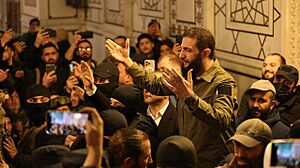
On December 8, 2024, the Prime Minister, Mohammad Ghazi al-Jalali, announced that the Syrian government would hand over power. This happened after Assad left Damascus. Al-Sharaa said that al-Jalali would oversee government groups until a new government was formed. Al-Jalali confirmed he had spoken with al-Sharaa about the handover.
Al-Sharaa gave a speech at Damascus's Umayyad Mosque. He called the fall of Assad's government "a new chapter." He criticized Syria's role as a "playground for Iranian ambitions." The next day, Mohammed al-Bashir, the head of the Idlib government, was asked to form a temporary government.
After Assad's Rule
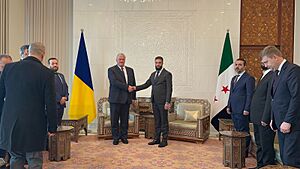
On December 12, 2024, al-Sharaa met with Turkish officials. This was the first diplomatic meeting since Assad was overthrown. On December 14, al-Sharaa said that the next phase would be a chance to serve Syrians and build the future. He explained that there was no reason for outside interference after Iranian forces left Syria. He also said that Russia had become unhappy with the Assad government.
The United States removed a $10 million reward offer for al-Sharaa's capture after he met with a U.S. group. This was the first official U.S. diplomatic presence in Syria in over 10 years. On December 24, al-Sharaa announced that many rebel groups would join the temporary government's Ministry of Defense. He also began setting up new government groups, including police forces.
On January 3, 2025, German and French foreign ministers visited Damascus. They were the first top European diplomats to meet al-Sharaa since Assad's fall. On January 29, a Russian group also visited Damascus to meet al-Sharaa.
Presidency (2025–present)
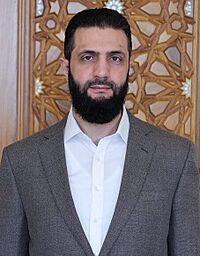 |
|
|
Presidency of Ahmed al-Sharaa
|
|
|---|---|
| 29 January 2025 – present | |
| Premier | Mohammed al-Bashir (2024–2025) |
| Cabinet | Provisional government (caretaker, transitional) |
| Appointer | Syrian General Command |
| Seat | Presidential Palace, Damascus |
|
← Bashar al-Assad •
|
|
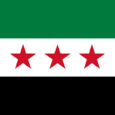 |
|
Becoming President
On January 29, 2025, Ahmed al-Sharaa was named the President of Syria. This announcement was made by Hassan Abdel Ghani, a spokesman for the rebel forces. Ghani stated that al-Sharaa would lead the country during a time of change. He would also act as president and represent Syria to other nations.
Al-Sharaa gave a short speech, outlining his government's main goals. These included filling the power gap, keeping peace, building government groups, improving the economy, and restoring Syria's place in the world. Leaders from other countries, like Vladimir Putin and Justin Trudeau, congratulated him.
First Actions as President
On January 30, 2025, the leader of Qatar, Tamim bin Hamad Al Thani, became the first head of state to visit Damascus since Assad's fall. He discussed rebuilding Syria. On February 8, a group from the Organisation for the Prohibition of Chemical Weapons also visited al-Sharaa.
On February 12, al-Sharaa spoke with Russian president Vladimir Putin by phone. This was Putin's first contact with a Syrian leader since Assad was overthrown. On the same day, al-Sharaa met with representatives from other Syrian opposition groups. On February 17, al-Sharaa made his first official trip to the coastal areas of Latakia and Tartus. These areas were once strongholds of Bashar al-Assad.
On February 21, he met with China's ambassador to Damascus. On February 23, Israeli Prime Minister Benjamin Netanyahu demanded that southern Syria be completely without military forces. Al-Sharaa rejected these demands. Hours later, Israel carried out airstrikes in Damascus and southern Syria. On April 18, Palestinian President Mahmoud Abbas met with al-Sharaa in Damascus. They talked about improving their relationship.
Changes Inside Syria
As president, al-Sharaa signed an agreement with Druze representatives from Suwayda Governorate on March 11, 2025. This agreement brought the Druze community into government groups. It also allowed them to form their own local police forces and recognized their unique culture.
On May 17, al-Sharaa signed orders to create two new groups: the National Commissions for Missing Persons and Transitional Justice. These groups would help find missing people and work towards fairness during the country's changes. On June 13, he signed another order to create a committee. This committee would help elect members to the People's Assembly.
New Temporary Constitution
On January 29, 2025, the 2012 constitution from Assad's time was canceled. On January 31, al-Sharaa said he would hold a "national dialogue conference." He would also issue a "constitutional declaration" to guide the country. On March 2, al-Sharaa announced a committee to write a temporary constitution.
On March 13, al-Sharaa signed a temporary constitution for a five-year period of change. This constitution sets up a system where the president has executive power and appoints ministers. It states that Islamic law is the main source of legal rules. However, it also protects freedoms of opinion and expression. The People's Assembly was created to act as the parliament during this five-year period. It will oversee the writing of a new, permanent constitution.
Conflicts in Western Syria
By March 6, 2025, fighting broke out in Western Syria between those loyal to Assad and the new Syrian government forces. This was the worst violence since the rebels took over. On March 8, al-Sharaa spoke to the Syrian people. He said that some parts of the old government tried to test the new Syria. He stated that Syria was now united. He demanded that they give up their weapons.
Al-Sharaa urged his fighters to "avoid any abuses" after reports of violence against Alawite civilians. On March 9, al-Sharaa announced a committee of judges to investigate these events. He said the violence was part of "expected challenges." On March 10, al-Sharaa condemned the killings of Alawite Muslims. He promised to hold everyone responsible accountable, even those close to him. He said he would make sure the law was followed and prevent conflict.
On March 12, al-Sharaa signed an agreement with Mazloum Abdi, the leader of the Syrian Democratic Forces (SDF). This agreement would bring SDF-controlled groups into the government. It also aimed to fight the remaining parts of the Assad government. The same day, a National Security Council was formed, led by al-Sharaa.
Conflicts in Southern Syria
In July 2025, armed clashes happened between Syrian Druze and Bedouin groups in Suwayda. The Syrian military was sent to restore order and clashed with some of the fighters. The Israeli Air Force said it attacked Syrian tanks as a "warning." On July 16, the Israeli Defense Force bombed the entrance to the Syrian military headquarters in Damascus. This was a warning due to the Syrian army's presence in Suwayda. Later strikes also hit near the Presidential Palace.
In the evening of July 16, the Syrian army began leaving Suwayda. The Syrian Ministry of Defense said the withdrawal happened after operations against "outlaw groups." Al-Sharaa addressed Syria, saying the government's priority was to protect Druze citizens. He criticized Israel's attacks and thanked American, Turkish, and Arab mediators for helping to calm the situation.
Government and Cabinet
On March 29, 2025, al-Sharaa announced the formation of the transitional government. This happened at the Presidential Palace in Damascus. The new ministers took their oaths and shared their plans. This government replaced the temporary one set up after Assad's fall. Four of the new ministers belonged to minority groups: an Alawite, a Druze, a Christian, and a Kurd. The government also included people from different parts of the former Syrian opposition. This new government was seen as being made up of experts, with ministers chosen for their skills.
International Relations
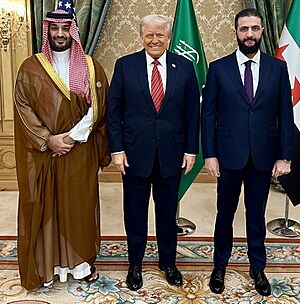
Al-Sharaa has shown that he values Syria's diversity. He has also changed his views on domestic and foreign policy. After becoming president, al-Sharaa traveled to several countries. These included Azerbaijan, Bahrain, Jordan, Kuwait, Saudi Arabia, Egypt, France, Qatar, Turkey, and the United Arab Emirates.
On May 7, 2025, he met with President Emmanuel Macron in France. This was his first official visit to a Western country as president. On May 14, he met with U.S. President Donald Trump in Saudi Arabia. This was the first meeting between American and Syrian presidents since 2000. Al-Sharaa urged Trump to join the Abraham Accords. The Crown Prince of Saudi Arabia and the President of Turkey also attended the meeting.
Reducing Sanctions on Syria
Since 2011, many countries had placed sanctions on Syria. These were mainly because of the Assad government's actions against civilians during the civil war. In an interview in April 2025, al-Sharaa said that these sanctions should be lifted. He explained that they were hurting his government and slowing down economic recovery.
The following month, President Trump and the European Union said they planned to ease sanctions against Syria. On May 23, the Trump administration lifted many sanctions. On June 30, Trump signed an order removing U.S. sanctions on Syria, except those linked to the Assad family.
Political Views
Views on Syria's Future
Al-Sharaa has spoken about his hopes for Syria's economy. He believes Syria needs experts to use the country's resources and learn from other nations. He sees "major investment and economic opportunities" after Assad's government fell. He also thinks Saudi Arabia can play a big role in Syria's economic growth. He hopes the U.S. will lift sanctions, as they were meant for the Assad government. One of his main goals is to rebuild the economy by issuing a new currency once the current one is stable.
In his first interview as president on February 9, 2025, al-Sharaa said he was against a federal system in Syria. When asked if Sharia law would be put in place, he said that decision would be up to experts. He also said that if democracy means people choosing their leaders, then Syria is moving in that direction.
In April 2025, al-Sharaa said his government was thinking about giving citizenship to foreign fighters who had lived in Syria for many years. He also mentioned talks with Turkey and Russia about their military presence in Syria. On May 27, 2025, al-Sharaa spoke at an event celebrating the Syrian revolution. He told Syrians to help rebuild the country, saying, "Our war against tyrants has ended, and our battle against poverty has begun."
Views on Israel and Gaza
Al-Sharaa has said that after the fall of the Assad government, Israel no longer has "any excuses" to attack Syrian land. He believes that talking and working together is the only way to ensure safety. He has also said that his government will continue to follow the 1974 agreement that ended the Yom Kippur War between Syria and Israel. In December 2024, he repeated Syria's commitment to this agreement.
On December 14, 2024, al-Sharaa made it clear that his government was not interested in a new conflict with Israel. He stressed that Syria's main goal was to rebuild after years of war. He said that diplomatic solutions were the only way to ensure safety and stability in the region.
On February 11, 2025, al-Sharaa said that Trump's idea for the United States to take over the Gaza Strip would not work. He stated that no power can force people from their land. On March 4, 2025, at a meeting about Gaza, al-Sharaa spoke against forcing Palestinians to leave their homes. He called this a threat to all Arabs.
In May 2025, al-Sharaa spoke about Syria's future relationship with Israel. He said, "the era of endless bombings must end." He added that nations cannot thrive when there is fear in the skies. He also noted that Syria and Israel have common enemies and can play a big role in regional safety.
Views on Iran
Since the fall of the Assad government, Ahmed al-Sharaa has spoken about Iran's involvement in Syria. For many years, Syria and Iran were allies. In December 2024, al-Sharaa said that under Bashar al-Assad, Syria became a way for Iran to gain influence in other Arab cities. He said Iran expanded conflicts and caused instability. He described Iran's regional goals as harmful. In February 2025, al-Sharaa called Iran and its allies a "strategic threat to the entire region."
Personal Life
Not much is known about al-Sharaa's personal life, as he keeps it private. In 2012, Time reported that he wore a mask at meetings to hide his identity. Al-Sharaa enjoys playing basketball and horse riding.
Al-Sharaa met Latifa al-Droubi when they were both students at Damascus University. They got married in 2012 and have three children.
Safety Concerns
The U.S. Special Envoy for Syria, Tom Barrack, warned that there might be attempts to harm al-Sharaa. This was due to his efforts to build ties with Western countries and promote fair governance. In June 2025, it was reported that al-Sharaa avoided two attempts on his life by extremist groups. These groups were against his ideas. On June 27, 2025, al-Sharaa was the target of another attempt, which was stopped before it could happen. The government denied reports of this specific incident.
See also
 In Spanish: Ahmed al-Charaa para niños
In Spanish: Ahmed al-Charaa para niños
 | Lonnie Johnson |
 | Granville Woods |
 | Lewis Howard Latimer |
 | James West |


